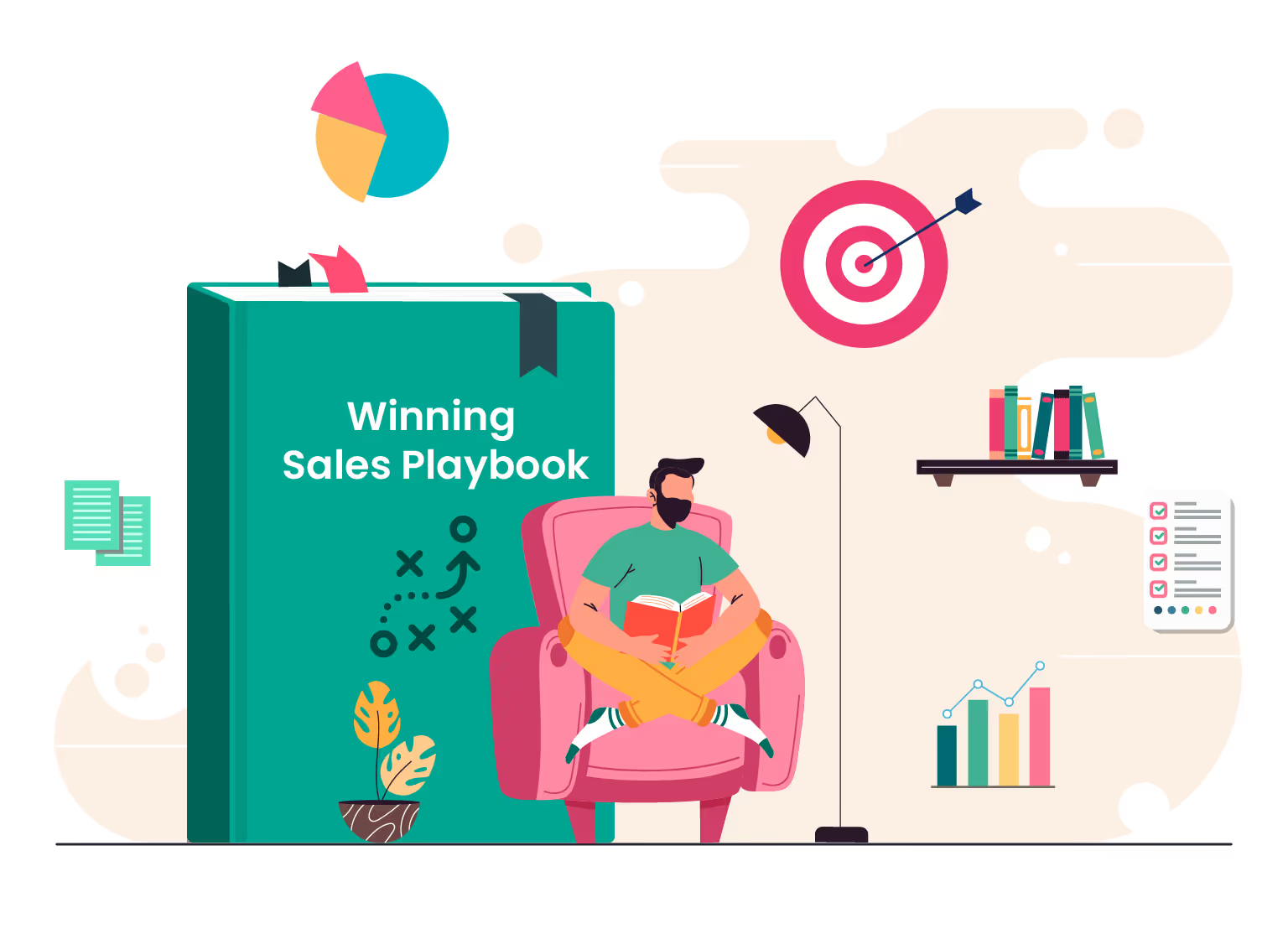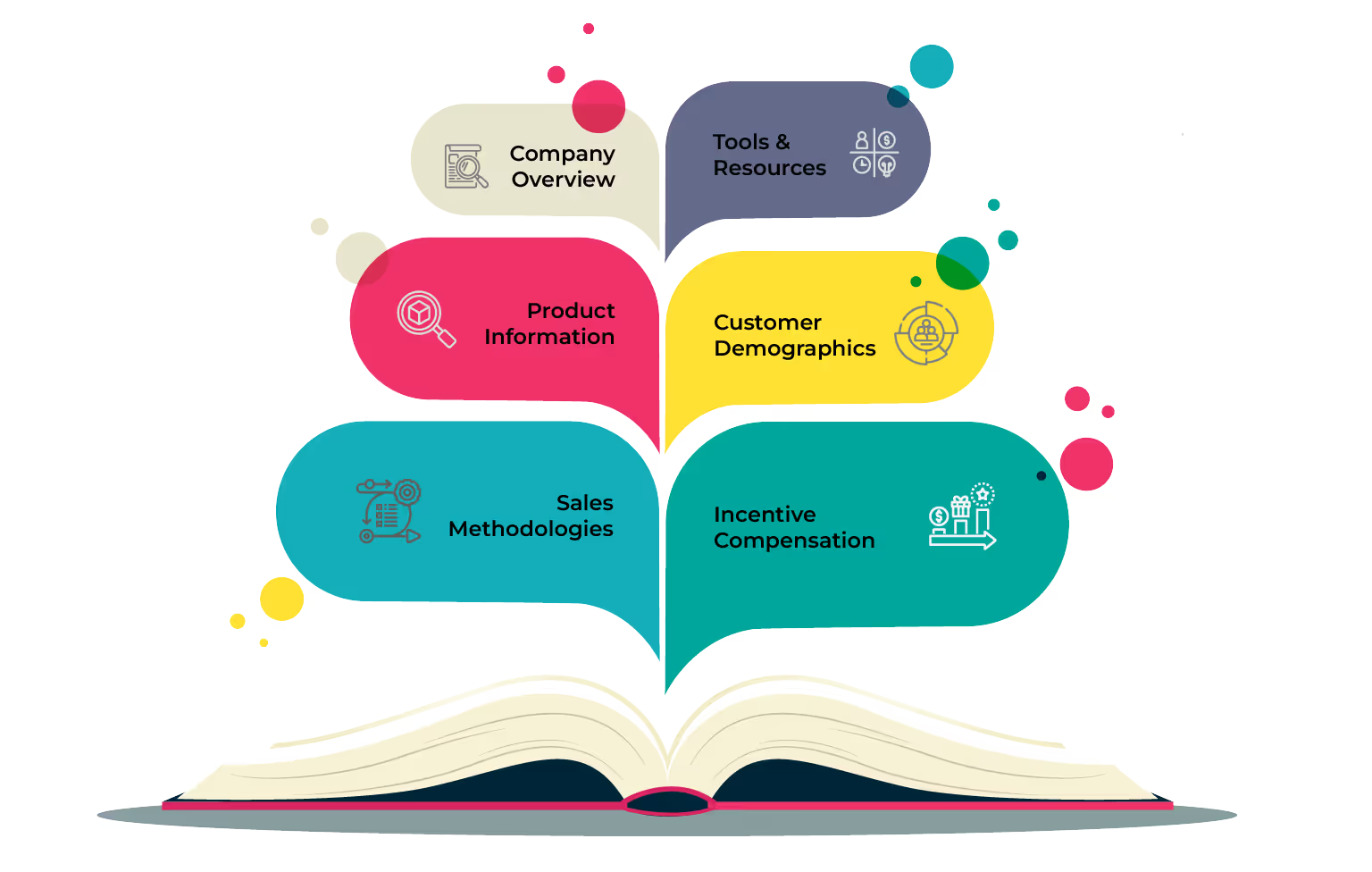
Blog
A Step-by-Step Guide for Success in Creating a Winning Sales Playbook
October 17, 2023


Key Insights
If you've ever wondered how some reps make selling look so darn easy, you're about to discover their secret weapon:
The sales playbook.
Imagine having a magic playbook that tells your sales team exactly what to do and say to turn a "just browsing" into a "let's do this!"
Sounds great, right?
That's exactly what we're diving into today. So, grab your favorite beverage, this is going to be a detailed read!
What is a Sales Playbook?
A sales playbook is essentially a comprehensive document that outlines your company's sales process, best practices, strategies, and tools.
It’s the blueprint every salesperson follows to move a deal from prospect to paying customer.
Like any good playbook, it’s part strategy, part training manual, and part insider guide to your customers' minds.
What is the Difference Between a Sales Playbook vs. a Sales Kit vs. a Sales Play?
When you're in the sales game, having the right tools and strategies at your disposal isn't just helpful; it's essential for scoring big wins.
So, let's clear up some common mix-ups by explaining the differences between a sales playbook, a sales kit, and a sales play.
What is a Sales Play?
A sales play is like a secret move in your game plan.
It's a specific strategy designed to tackle a particular scenario in the sales process.
Think of it as a single play in football – it's not the whole game plan but a strategic move to advance the ball down the field.
Sales plays are detailed tactics that guide your sales team on how to approach leads at different stages, whether it's breaking the ice with a new prospect or sealing the deal with a hesitant buyer.

What is a Sales Kit?
A sales kit, on the other hand, is your utility belt.
It's packed with tools, documents, and resources your sales team can use during their sales pitches.
This could include product brochures, price lists, case studies, FAQs, and even demo scripts.
The sales kit is designed to support the sales play by providing all the necessary materials to make the sale as smooth and effective as possible.
Why sales playbooks are critical for modern sales teams.
Let’s face it: Today's sales environment is more competitive and complex than ever.
A sales playbook ensures that all team members, regardless of their experience level, have the insights and strategies they need to succeed.
It's about consistency, efficiency, and empowering your team to make smart, strategic decisions.
With a playbook, you’re not just reacting to the market, you’re anticipating and shaping it.
What’s included in a sales playbook?
Since we’ve established that this playbook is not just an add-on, but a necessity for your sales team; you want to make sure that it is as comprehensive as possible.

A stellar playbook should include:
- Target Customer Profiles: Detailed descriptions of ideal customers, including their needs, pain points, and decision-making processes.
- Sales Processes and Methodologies: Step-by-step guides for each stage of the sales process, from prospecting to closing.
- Messaging and Positioning Guides: Key messages and value propositions tailored to different customer segments.
- Competitor Analysis: Insights into competitors’ strengths and weaknesses and how to position against them.
- Case Studies and Success Stories: Real-world examples to demonstrate the value of your solutions.
- Objection Handling Frameworks: Strategies for addressing and overcoming common customer objections.
- Tools and Resources: A list of software, templates, and resources that support the sales process.
How to Build a Winning Sales Playbook
It is inevitable for organizations with a sales team to have a sales playbook. Let's explore the step-by-step process of building a winning sales playbook.

Building a winning sales playbook involves several key steps:
- Define Your Sales Process: Map out each step of your sales cycle, from initial contact to closing.
- Gather Input from Your Team: Include insights and feedback from your salespeople, who are on the front lines.
- Document Best Practices: Identify the strategies and tactics that have led to success in the past.
- Include Relevant Content: Equip your team with the resources they need for each stage of the sales process.
- Train Your Team: Ensure everyone is familiar with the playbook and understands how to use it effectively.
Mistakes to Avoid in Your Sales Playbook
Crafting a killer sales playbook is both an art and a science. However, even the best sales reps can sometimes miss a stroke. Here are some common pitfalls to steer clear of:
- Several Floating Versions: Imagine if every member of your team had a different playbook. Chaos, right? Ensure there's a single, definitive version of your sales playbook to keep everyone on the same page.
- Lack of Customization: Your sales playbook should be as unique as your business. A one-size-fits-all approach won't cut it. Tailor your playbook to fit your products, market, and sales cycle for maximum effectiveness.
- Overlooking Regular Updates: The only constant is change, especially in sales. Your playbook needs to evolve with your business, market trends, and customer behavior. Regularly review and update it to keep it fresh and relevant.
The Best Sales Playbook Examples in 2024
Imagine playbooks so effective they practically close deals on their own!
Here are our top 2 picks! These playbooks seamlessly integrate modern sales tools, data analytics, and personalized customer insights, turning every sales rep into a closer.
This playbook is designed to facilitate nuanced conversations between sales reps and prospects across various industries, through a layout that dedicates each spread to a specific customer type.
It stands out for its focus on discovery questions, listening cues, relevant contacts, and insightful tidbits about the significance of GTS’s solutions, balancing structured guidance with the flexibility needed to adapt to dynamic sales scenarios without being overly directive.
The Cobalt Iron Partner Playbook offers a comprehensive toolkit for partners, encapsulating an in-depth overview of the company and its offerings, alongside strategic communication tips like elevator pitches and conversation starters.
It dives deep into understanding customer challenges, profiling target customers and buyers, managing objections, and positioning against the competition.
This playbook excels in thoroughness, presenting a wide array of industry insights and practical strategies to equip partners with the knowledge and confidence to navigate the sales landscape effectively.
B2B Sales Playbook Examples
B2B sales are a different beast, requiring a more nuanced approach.
The top playbooks in this arena are built around deep market analysis, understanding customer pain points, and establishing value early on.
They often include detailed account-based marketing strategies and case studies that speak directly to similar businesses.
Here’s our top picks:
This comprehensive guide dispel common myths and bring to light the true potential of a B2B organization that is aligned with the company's strategic goals. From budgeting wisely and maximizing margin yield to leveraging the power of branding and understanding the nuances of ROI and positioning, this playbook covers a wide array of topics critical for today's business leaders.
This Playbook can serve as a comprehensive guide to everything a founder needs to understand about their enterprise sales function.
With loads of decks and reports, it also has interviews and inputs from founders, their executive teams, marketing, sales and customer success representatives.
Integrating Sales Playbooks into Onboarding and Training Programs
Your sales playbook isn't just a guide; it's the cornerstone of your sales training and onboarding process.
Integrating the playbook into these programs ensures that every new hire is not just reading but living by the playbook.
It becomes the script for role-plays, the benchmark for performance evaluations, and the go-to resource for sales strategies and tactics.
What is the Structure of a Sales Playbook?
The structure of a sales playbook can vary, but it typically includes:
- Introduction: An overview of the sales process and objectives.
- Customer Profiles: Detailed descriptions of your ideal customers.
- Sales Process: Step-by-step guide through your sales cycle.
- Sales Plays: Specific strategies for different sales scenarios.
- Tools and Resources: A list of all the materials in your sales kit.
- Success Metrics: How success will be measured and tracked.
What is the Syntax of a Sales Playbook?
Think of the syntax of a sales playbook as its language and grammar.
It's how the playbook communicates your sales strategy to your team. This includes the style, tone, and clarity of the information presented.
It should be written in a way that's easy for your sales team to understand, absorb, and execute.
What is a Sales Playbook Framework?
The framework of a sales playbook is its foundational structure.
It outlines the essential components and how they fit together to guide your sales team towards success.
This typically includes your sales methodology, customer journey mapping, content strategy, and engagement tactics.
The framework ensures that your playbook is not just a collection of strategies but a cohesive system that aligns with your overall sales goals and objectives.
Crafting your sales playbook with these considerations in mind not only sets your sales team up for success but also ensures your playbook remains a living, breathing document that grows with your team and your market.
Happy selling!
How to keep your sales playbook up to date
The best sales playbook is a living document that evolves.
Regularly review and update it to reflect new insights, strategies, and market conditions. Encourage feedback from your team, and make sure to do these three things:
- Incorporate new sales tactics and technologies.
- Update customer profiles and market trends.
- Refine your process based on what’s working (and what’s not).
Parting Words of Wisdom:
Creating a sales playbook isn’t just about putting words on a page; it's about building a culture.
It’s a living document that grows and evolves with your team.
So, there you have it, folks. Your journey to sales superstardom starts with a playbook.
But remember, the true magic doesn’t lie within the pages—it springs to life when you and your team bring those words into action.
Here’s to closing deals, exceeding targets, and doing it all with style and confidence. Cheers to your success!
Kennect runs your sales compensation programs in cruise mode to create transparency and achieve operational efficiency. For more information, Book A Demo NOW!
ReKennect : Stay ahead of the curve!
Subscribe to our bi-weekly newsletter packed with latest trends and insights on incentives.
Thank you! Your submission has been received!
Oops! Something went wrong while submitting the form.
Your data is in safe hands. Check out our Privacy policy for more info





.avif)









